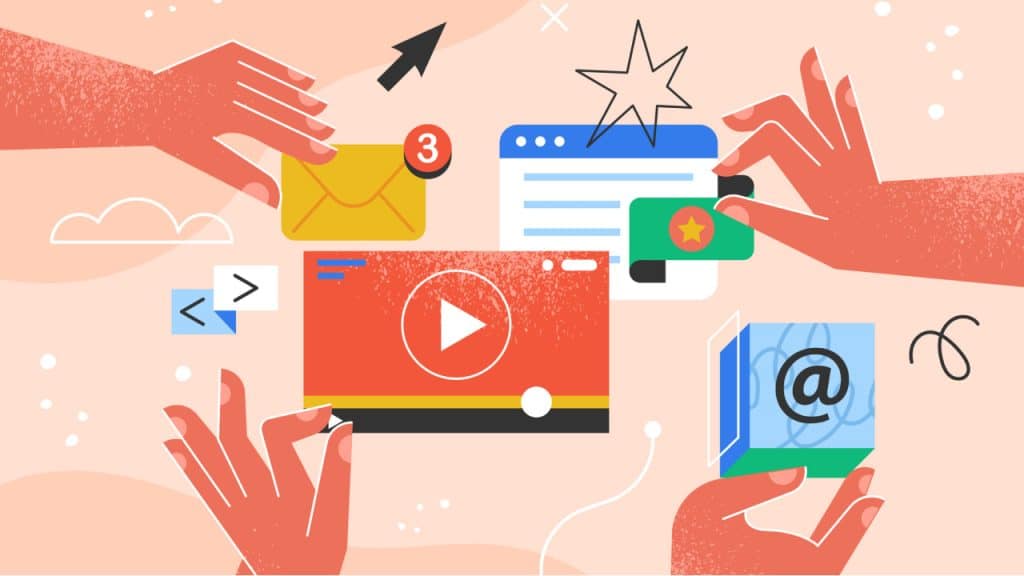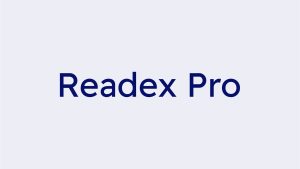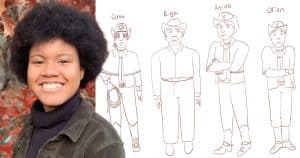How to Become a Digital Marketer: A Complete Guide

Whether you’re pivoting to a new role or exploring how to become a digital marketer as your first job, this guide walks you through how to achieve your goal. We’ll uncover what digital marketing entails, explore its evolution over time, and give you a roadmap to kickstart an exciting and fulfilling career in this fast-paced field.
IN THIS GUIDE:
What Is Digital Marketing?
This professional field encompasses many online digital marketing strategies for engaging potential customers. In a way, the digital marketer is the creative and analytical hero of the modern-day business. It’s a career for observant people who love to brainstorm and ideate, those who create “wow” moments that become viral and shape social trends.
Digital marketing has existed since the early 1990s, when advancing technologies began allowing marketers to take their strategies online. The first-ever clickable banner was an AT&T ad, which appeared in 1994.
Here’s a quick look at how much digital marketing has evolved since its humble beginnings:
- The late 1990s saw more companies appeal to brand-new search engines like Yahoo and Google to appear in search results, giving rise to search engine optimization (SEO).
- In the 2000s through the 2010s, developing social media sites like LinkedIn, Facebook, and Twitter allowed brands to speak directly to and interact with their audiences, rather than one-way traditional channels like magazine ads, newspaper features, or billboards. These social media sites opened the doors for others like Instagram and Snapchat and to roles like a social media manager, digital marketing manager, and influencer marketer, who gauges metrics to understand user behavior and engage more people.
- Digital marketing continues to evolve, now incorporating data-driven marketing with artificial intelligence and automation. For instance, research shows that 74% of customers prefer a chatbot over a human for quick queries.
- As ecommerce platforms like Amazon and Shopify became dominant, digital marketers have begun leveraging lifecycle marketing to guide customers at every touchpoint, from awareness to purchase and beyond. To do this, they use email, retargeting ads, and loyalty programs to form long-term relationships.
- Website tools like Google Analytics are now central to understanding customer behavior, tracking clicks, conversions, and traffic sources, so digital marketers can optimize strategies in real time and improve user experience faster.
This constant growth is why, within this field, you’ll find digital marketing experts specializing in every touchpoint brands have with customers and beyond. Modern businesses use email, social media, search engines, pay-per-click (PPC) ads, and websites, to engage customers, build awareness of their offerings, and sell products or services.
Digital marketers can work in any of these areas. In general, they create and carry out strategies to deliver a marketing message across different channels. These professionals and marketing teams work together to improve a business’s online brand visibility, attract new leads (potential customers), and drive sales.
Career Outlook for Digital Marketing
A digital marketing career offers a dynamic daily life balancing creativity, data analysis, and continuous learning. The many possible roles all have a promising future as technology advances. Digital marketing is one of the fastest-growing, in-demand job skills in recent years. The advertising and marketing field, including digital marketing, is expected to grow by 8% between 2023 and 2033. This is faster than the average for all occupations in the country. Social media skills alone are in high demand, worth an estimated $1.5 trillion by 2030.
As new platforms arise and brands continue to compete online, there are a lot of benefits to taking up a marketing career. Because of the high demand and the need businesses have for strong marketing teams that understand their message and the channels with which to reach their customers, there is a lot of job security.
Additionally, once you’re established as a digital marketing professional, you can quickly move from one role to another, making it one of the most interesting professions. Finding the niche role that calls out to you will be important as specialized consultants and other experts will be in high demand.
As your expertise grows, so will your value to companies, giving you a strong earning potential. An entry-level social media marketer may make $15-$20 per hour, but a data analyst salary ZipRecruiter lists at over $91,000/year on average, and Indeed shows an average base salary for an SEO specialist at around $64,000. So there’s a range depending on what area you want to get into in digital marketing.
Should You Become a Digital Marketer?
Now that you’ve learned more about digital marketing and the career opportunities that could await you, how do you decide if you should become a digital marketer? It comes down to both your interests and your strengths. A successful digital marketer balances creativity and data analysis to make decisions that accurately reflect customers’ needs and preferences to improve a business’s relationship with them.
If you enjoy crafting a clear message, staying updated on trends and cultural impacts online, and experimenting with digital platforms, digital marketing could be a perfect career. It is also great for people who want to see direct business impact from their work in generating sales and acquiring customers. It’s a rewarding job with constant evolution and great flexibility to pivot to different specialties.
Steps to Becoming a Digital Marketer
So you’re looking for how to become a digital marketer. Take a look at the steps to get there, from mastering the basics to gathering a portfolio of hands-on practice to get your foot in the door.
1. Assess Your Current Skill Set
Digital marketers need to be both creative and analytical. What other attributes could you bring to this new vocation? Take stock of your soft and hard skills. You may already have much of what it takes to be a digital marketer.
Important transferable skills include writing, communication, and trend and data analysis:
- If you’re strong in writing and communication, roles like content marketing, social media, or email marketing could be a great fit as they call for you to craft compelling messages, create engaging content, and connect with audiences.
- For more analytical types, roles like SEO specialist, paid digital advertising manager, or lifecycle marketer could appeal to you as they involve optimizing strategies, managing ad budgets, and analyzing behavior to improve performance.
- For visual creatives and designers, marketing design or creative strategy could be interesting. These focus on visual content and campaign ideation.
Matching your natural talents with the right role sets you up for success, ensuring that your work is fulfilling.
2. Gain a Foundational Understanding of Digital Marketing
Once you know what you’re bringing to the table, list the additional skills you’d like to gain depending on the type of role you are going after. Zero in on crucial employer requirements and build a repertoire of foundational marketing skills to match.
Sign up for a digital marketing course, or look for something your dream employer wants in a new hire and work backward. After you have a good foundation of general marketing knowledge, you can stack more skills on top by signing up for SEO courses and learning PPC advertising, graphic design, or social media and content strategy, depending on your goals.
3. Get Hands-On Practice
Now you have a slew of marketing theory and insights under your belt and are ready to take on a real-life project. Many marketers have gone straight into a junior position to try their hand at real-life situations, but you don’t have to. While you study, you can get hands-on experience through internships, freelance projects, or small business marketing opportunities. At Sessions.edu, you can get real-life experience as you gain skills to build your resume in tandem from the start.
4. Build a Resume
To show your skills and experience, create the resume you’ll send to potential employers by organizing your strengths. List your certifications and how you’ve put them into practice.
Because marketing is such a flexible career, it always requires adaptation. Highlight your dedication to learning and include examples of your work with results you’ve achieved.
The impact you had in your roles is what higher-ups will look for when assessing your resume, so make sure the results you achieved are clear and quantitative. For example, share the reach of your social media post, the conversions on a PPC ad, or the organic search traffic for the blog post you wrote. Match your portfolio to what the job posting says is necessary, including only relevant information.
5. Build a Professional Network
Knowing the right people to show your resume to makes a big difference in marketing. Connecting with industry communities on LinkedIn, attending in-person industry events and online webinars, and exchanging information with other professionals can form professional relationships that will prove key when searching for jobs.
Can You Become a Digital Marketer With No Experience?
Worried about how to become a digital marketer with no experience? You can definitely start a digital marketing career without formal experience, and many professionals have.
Unlike professions like law or medicine, digital marketing can be learned empirically. However, coming into it with a foundation will give you a significant advantage because you can hit the ground running without needing your new employer to fully train you—a difficult ask in today’s market.
Taking on internships, courses, or small projects can be enough to get your foot in the door. On the other hand, getting a more robust education with an opportunity to get experience will make you stand out and potentially give you a higher salary once you start.
Useful Education for a New Digital Marketer
When employers are out to hire marketing professionals, they won’t always look for a degree but rather certain qualifications and skills that show a candidate’s readiness for the role. Related bachelor’s degrees include communications, journalism, or English, but the practical skills a certificate from Sessions College offers can be just as relevant.
Take a job listing for a Digital Marketing Specialist role in Chicago taken from ZipRecruiter as an example. They want:
- A BA in a related field (though it’s often not a deal-breaker; certifications and alternative education options can be sufficient)
- Hard skills such as writing, proofreading, content creation, brand messaging, and effective email marketing strategy
- Digital marketing time management, multi-tasking, and teamwork
- Self-motivation to improve as strategies and technologies constantly evolve
- Tools to be proficient in include:
- Microsoft Office, social media platforms, databases, CRM systems, email marketing software
- Knowledge of Adobe Creative Cloud, especially for visual content creation and marketing graphic design roles.
As you can see, employers want candidates with a mix of soft and hard skills. While of course they value expertise, qualities like creativity, self-motivation, and communication will take you a long way.
Jobs You Can Pursue with a Marketing Education
Digital marketing is a broad field with many roles tailored to different skills and interests. The right role for you will depend on what excites you and the skills you want to develop. Here are some typical roles you’ll find when exploring how to become a digital marketer:
- Social Media Marketers ideate, edit, and publish posts on social media platforms to engage leads and customers and drive sales. They collect, analyze, and take action on data from these platforms to improve brand-customer relationships and foster trust.
- SEO Experts take web content and optimize topics, authoritativeness, and other elements to improve visibility in search engine results.
- Ecommerce Marketers promote products online on digital channels, optimizing web pages, payment processes, email and SMS campaigns and more to improve the buying experience.
- PPC Advertisers focus on reaching audiences on Google, Facebook, and other platforms and create campaigns for pay-per-click ads.
- Email Marketers specialize in email campaigns, from informative emails and sales to newsletters and company updates.
- Content Marketers create and share valuable content via different platforms like blogs and videos to attract and retain audiences online.
- Marketing Designers work on the visual aspects of digital marketing design, making compelling graphics and visuals for social media, web ads, and other digital content. This role requires a blend of graphic design and marketing knowledge to create visuals that effectively communicate brand messages.
These roles and many more in marketing work together toward a company’s success and evolve with technological advancements. This makes for a dynamic career that rewards creativity, critical thinking, and adaptability.
Digital Marketing FAQ
Q: Is digital marketing in demand?
Yes, digital marketing is in high demand because online engagement is the name of the game for the majority of modern businesses. Those interested in how to become a digital marketer should learn how professionals use ecommerce, social media, and data-driven strategies to navigate these digital channels. The field offers job security and diverse career paths for those ready to take them.
Q: How do I become a digital marketer?
To understand how to start digital marketing, begin learning foundational skills like SEO, social media, and content strategy. Get knowledge via online courses, certifications, or resources on platforms such as Sessions College.
Of course, a career is even more about applying your skills. Look for internships, freelancing opportunities, or personal projects to get hands-on experience.
Q: How do I gain digital marketing experience?
When looking for how to get into digital marketing, gaining experience is essential. Start with online courses to learn core skills and then apply them through practical experience. You could manage a social media account in an internship, run a small PPC campaign for a local business owner, or optimize a website for SEO as a freelance project, for example.
Relevant Sessions Programs
For those exploring how to become a digital marketer, building skills through focused, hands-on learning is essential. Sessions College offers tailored programs teaching the fundamentals of digital marketing as well as offering practical experience to set you apart when applying for jobs.
With certificate options in marketing and advertising design, you’ll gain industry-relevant experience in the digital marketing field. Explore the Marketing Design program or sign up for the Advertising Design certificate to take your first steps toward your new career.

Ximena Restrepo is a freelance writer and marketer native in Latin American Spanish and North American English. She's worked as a writer for travel blogs, a content marketer for a baby tech company in Taiwan, and an SEO agency in the UK. Read more articles by Ximena.
ENROLL IN AN ONLINE PROGRAM AT SESSIONS COLLEGE:

























